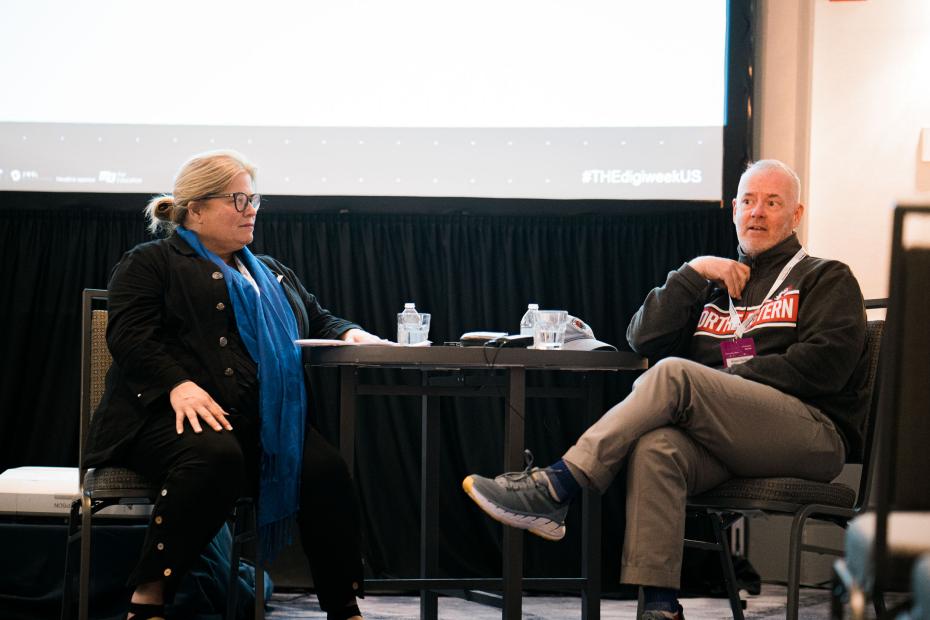
Pay it forward: how to help students secure financial aid

Applying to college isn’t easy. Prospective students have to determine which school they want to attend, what they want to study and what steps will lead to their admission – and most of that’s done before they factor in what it will cost.
The price of attending college and obtaining a degree can be eye-watering, and for many, receiving some form of financial assistance is crucial. Some 52 per cent of students stayed in college thanks to the aid they received, according to a study by Gallup and the Lumina Foundation. While 98 per cent of families consider financial assistance necessary to pay for college, and 39 per cent say their biggest concern when applying was the amount of debt they'd need to take on before getting a degree, The Princeton Review found.
A report from MICU shows an interesting dichotomy in comparing types of debt. It states that while more Americans hold car debt than student debt, no one bats an eye at auto loans because they understand the economic need, despite the depreciating value of a car. But when it comes to considering the value of student loans, people argue about the cost even though the economic benefits to a person with a degree are clear and increase over time.
- How to ensure college admissions are equitable and accessible
- Resource collection: How to achieve equity in higher education
- Spotlight guide: Catching students before they fall
I’ve spent years encouraging students to pursue higher education, and I’ve come to recognise that if money is a concern for applicants, it must be for colleges as well. Admissions officers must acknowledge the role financial need plays in decisions, be up front when talking about it and offer solutions. Here are three ways to help prospective students obtain financial aid to support their education and make their dreams a reality.
1. Don’t be afraid to ask tough questions
It can be uncomfortable asking prospective students and their families how they plan to pay for college. It can be awkward – or even embarrassing – for them to answer questions about finances, especially if that means acknowledging they don’t have the answers or they can’t afford it.
The conversation can’t be avoided. Whatever their answer, make it clear that honesty is the first step in building a financial plan and that no barrier is too big to overcome. Once the initial subject is broached, you can outline the variety of grants, scholarships and other financial aid programmes available, including subsidised and unsubsidised loan funding.
It’s also an opportunity to mention that community college might be the right alternative. Many students and families can be turned off by the concept of community college, but it’s worth consideration. It may help to remind them their bachelor’s degree only recognises where they graduated from.
What’s most important is letting them know that not everyone’s path to a college degree is the same, but the evidence is clear: earning a bachelor’s degree results in higher lifetime earnings, lower unemployment rates and more flexibility as the market changes. It’s your responsibility as an admissions counsellor to be a source of good information and support.
2. Provide resources that make everyone feel comfortable
The best advice I can give anyone working to pay for college is to turn around. Not literally, of course, but have them consider their immediate surroundings and who they can leverage for help. That could be relatives, local clubs and organisations or community institutions. My family has a legacy scholarship at the University of Maine and, while I didn’t go there, it would have made the cost more affordable if I did.
Having applicants look locally first can make the hunt for financial assistance more manageable. A student can be discouraged when they realise they’re one of thousands applying for a national scholarship, but a local one seems more feasible if they learn they would be one of a dozen applicants.
Encourage them to think about who they are and what they want to study. A student who hopes to major in journalism might find scholarships and grants offered by a college’s communications department. Aid can also be available based on one’s heritage, religion, civic participation, physical characteristics and talents, among other factors.
Plenty of programmes can alleviate financial burdens, but if applicants and their families don’t know where to turn, they might leave valuable funding on the table or, worse, walk away from higher education.
3. Ensure financial aid and admissions departments work in tandem
College applicants want to know they’re being guided in the right direction. I find a personal touch can go a long way toward putting concerns to rest. It starts with having your admissions and financial aid departments working hand in hand.
It can be as simple as an admissions officer personally calling a colleague in financial aid instead of passing along a name and a phone number. Both sides should work together to make attending college as seamless as possible.
You should coordinate with high school counsellors to alert prospective students about the types of aid available and consider serving on scholarship committees to stay informed about new opportunities.
Collaboration between departments can make an uncertain process for prospective students and their families easier to navigate.
A shared responsibility for higher education
There’s no question the cost of higher education is a concern of prospective students and their families. According to a survey by the Citizens Financial Group in August 2021, 69 per cent of high school juniors and seniors and 70 per cent of college students said their concerns about the affordability of college affected their enrolment plans.
If we’re going to continue telling students that college is a necessary stepping-stone to a career, we must make sure they can see the path forward. It is paramount that we find a way for students from all walks of life to afford the degree they want. It isn’t just their problem any longer.
Aimee Huffstetler is assistant vice-president of enrolment at Gwynedd Mercy University.
If you would like advice and insight from academics and university staff delivered direct to your inbox each week, sign up for the Campus newsletter.
Additional Links
For more advice and resources on this topic, go to our Spotlight collection Helping students through the cost-of-living crisis.


